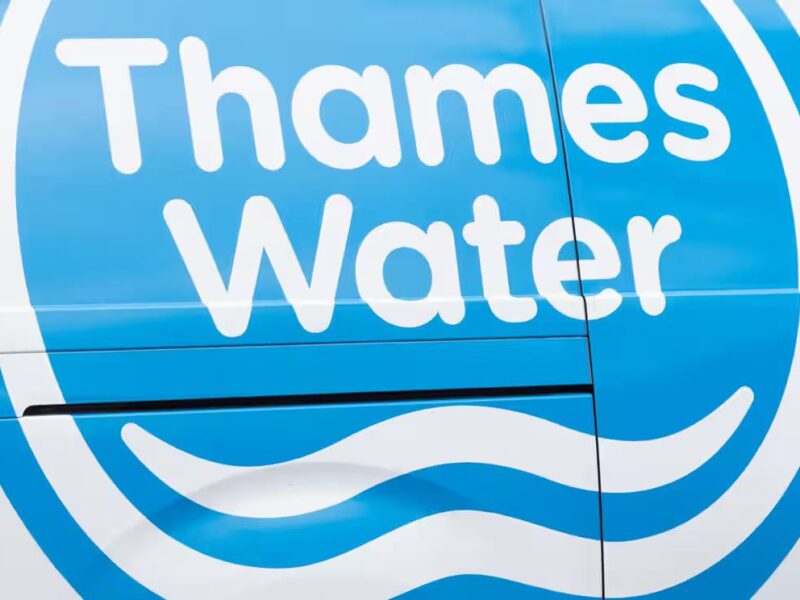Moody’s action comes as the company warns of’materially’ heightened risks that authorities will halt dividend payments.
Thames Water’s parent business has had its credit rating downgraded for the second time in six months, with Moody’s warning of “materially” increased possibilities that regulators would halt dividend payments.
According to the Guardian, the watchdog Ofwat is examining whether to probe Thames for a potential breach of its licensing when it issued a £37.5m dividend in October. The funds were transferred to a holding company from the primary operational company, which serves 16 million customers in London and the Thames Valley.
Following Moody’s downgrading on Wednesday, the market price of a £400m bond issued by Thames Water (Kemble) Finance, one of the primary financing firms that sits above the regulated water utility, fell to an all-time low of less than 50p in the pound. The payout was used to service some of the company’s debts.
The action comes after Thames recruited a new CEO last week, but its chair revealed he was speaking to shareholders “two or three times a week” to “jolly them along” before their crucial decision next year on whether to infuse further equity to prop up a business with total debts of £16 billion.
In May, the regulator imposed a new licence condition that places harsher limits on dividend payments if a firm fails its customers or the environment, or if its financial stability is jeopardized. Thames is one of the worst-performing major water firms, as well as one of the most indebted, with borrowings of about 80% of asset value vs a statutory norm of 60%.
The Moody’s review was prompted by Ofwat’s request for dividend information from Thames, despite the fact that the Kemble company’s rating was recently reduced from B1 to B2. The new grade is B3, which indicates a lesser level of junk.
According to the rating agency, “Because of the further tightened regulatory scrutiny of Thames Water’s distributions, Moody’s believes that the uncertainty around the operating company’s ability to make necessary distributions has increased materially.”
Sir Adrian Montague, the head of Thames and the ultimate parent company, Kemble Water Holdings, admitted this week that the payout was “discretionary” in testimony to MPs on the environment select committee. He claimed, however, that the contribution was necessary to keep hesitant stockholders loyal.
“Long story short, we paid that £37 million to keep Kemble secure,” he explained. We must protect Kemble because failure to do so will jeopardize our new equity. And the new equity is required to continue providing services to our consumers in the future.
Omers, a Canadian pension fund, is Thames’s largest investor, holding 32% of the company. Others include the Universities Superannuation Scheme, a pension fund for UK university lecturers, as well as Chinese and Abu Dhabi sovereign wealth funds.
The owners want to contribute £750 million in equity before March 2025, followed by £2.5 billion between 2025 and 2030, but both are contingent on what Thames calls a “appropriate” regulatory settlement in the next pricing control period. Thames wants to raise rates from £436 to £611 per year over the next five years to help pay for £18.7 billion in infrastructure, and it wants a cap on potential financial penalties.
Montague told lawmakers that shareholders “need to know whether enough cash is going to come into the company to support further investment.” “I speak to them two to three times a week because I believe it’s important that we help them along, jolly them along, until we reach a decision,” he added. We haven’t made a decision yet. We’ll be there when white smoke billows from Ofwat.”
Kemble will aim to extend the deadline for repaying a £190 million bank loan in March 2024. Moody’s said it also faces “further sizeable maturities,” including £510 million between July and December 2025, £150 million in April 2026, and the £400 million secured bond in May 2026.
The downgrade note said: “While shareholders have reiterated their support for Thames Water, further equity injections remain subject to conditions and may fall short of what is needed to underpin the credit quality of the holding company in the context of a challenging turnaround and heightened political and regulatory scrutiny.” It stated that Thames Water (Kemble) Finance’s official rating outlook remained negative.
The £400m bond fell to 56p in June following the resignation of previous CEO Sarah Bentley, as suspicions grew that the government was planning to nationalize Thames. These short-term concerns were allayed by a £500 million cash injection and conditional guarantees of more to come. However, the bond’s price decreased to 48.5p this week.
Thames Water Utilities, the full name of the regulated operating business, stated earlier this month in its half-year results that it had £3.5 billion in financial liquidity to support its investment plans over the current regulatory period, which ends in March 2025. It is still rated as investment grade. Chris Weston, the company’s new CEO, was previously the CEO of electricity supplier Aggreko.











